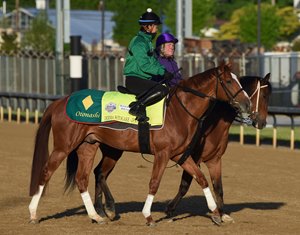Japanese Horses Seek Breakthrough Triple Crown Victory


The Japanese impact on Thoroughbred racing is being felt around the world.
There have been dominant days for the Asian nation at the world's top events such as the Saudi Cup (G1) and Dubai World Cup (G1).
Even here on American shores, the reach has touched the Breeders' Cup World Championships, as evidenced by a pair of 2021 victories from Loves Only You in the Breeders' Cup Filly and Mare Turf (G1T) and Marche Lorraine in the Breeders' Cup Distaff (G1).
Yet the story has been much different in the American classics. So far in the famed Triple Crown for 3-year-olds, horses bred and/or based in Japan have yet to make their presence felt. While Lani was third in the 2016 Belmont Stakes (G1), runners from Japan are 0-for-4 in the Kentucky Derby (G1) with a sixth-place finish by Master Fencer in 2019 the best showing.
A year ago, Crown Pride carried high hopes for a solid performance after winning the UAE Derby (G2) but he became embroiled in a withering pace and finished 13th.
Yet given recent performances such as Ushba Tesoro 's victory in the Dubai World Cup and a 1-2-3-4 finish earlier this year in the UAE Derby, it seems inevitable that a Japanese runner will play a huge role in the outcome of the Run for the Roses—and that time could be fast approaching.
Perhaps as fast as this weekend.
Two Japanese runners will be among the field of 20 that breaks from the gate in the May 6 Kentucky Derby with UAE Derby winner Derma Sotogake and Mandarin Hero , who was second in the Santa Anita Derby (G1), carrying the hopes that 2023 will mark a change in the fortunes for their country.

There easily could have been a third starter from Japan, but Continuar , who qualified through the Japan Road to the Triple Crown series, was scratched May 4.
"For Japanese horsemen, the American Triple Crown races have long been famous and coveted. The fact that two Japanese horses will run in this year's Kentucky Derby is not due to the growing interest in the Kentucky Derby in Japan, but rather to the fact that two Japanese horses were able to qualify for the Kentucky Derby under the rules of the Road to the Kentucky Derby as they were organized," said Ryoh Saito, senior manager of the Japan Racing Association's New York office. "In addition, in recent years, Japanese horses have been performing remarkably well around the world, and this is one of the factors that have increased their willingness to run in international races."
While success has been elusive to date, Saito knows that a victory by one of the Japanese starters would be a viewed as a heroic achievement back home.
"Not only the winning horse connections, but also all Japanese connections will be proud of the victory, as it is a win in a race that is well-known and coveted by Japanese horsemen," he said. "In addition, a Japanese horse winning the Kentucky Derby, the top race in American horse racing, proves not only the high level of Japanese horses, but also the ability of Japanese horses to adapt to the different racetracks, culture and atmosphere from those in Japan. It will be an incentive for Japanese horses to run in American races, including the Triple Crown races, in the future."
Derma Sotogake is considered the better of the two Japanese runners—a point underscored by their respective prices of 10-1 and 20-1 in the morning line.
"If that were to happen, it would change Japanese racing history," Masanari Tanaka, assistant to trainer Hidetaka Otonashi, said about the impact of a victory by Derma Sotogake.
Off his impressive UAE Derby win, Derma Sotogake might be viewed as the best Japanese horse to try his luck in the Run for the Roses.

"It depends on one's view. Derma Sotogake will run in the Kentucky Derby as the winner of the UAE Derby, so there is no doubt that he is a candidate for the best horse," Saito said. "However, it is difficult to determine which horse is the best based on simple criteria, as good performance in American races requires adapting to different and varied conditions."
Given the immense popularity of horse racing in Japan, accessing that Asian market is viewed as an important step in showcasing American racing to a voracious fan base.
"Originally, Japanese horse racing fans have had very high interest in international races. In this context, Japanese horses, Loves Only You and Marche Lorraine, have won two races in the Breeders' Cup in 2021, but have not won the American Triple Crown races, and the top American races are still perceived as a very high barrier," Saito said. "On the other hand, we believe that the fact that JRA has been offering wagering on the Breeders' Cup and Kentucky Derby in Japan in recent years has made these races more accessible to Japanese horse racing fans."
Gambling dollars are certainly vital to propel the sport and in the years to come fans in Japan could play an role in boosting American handle figures. So far, even though the race is contested at about 8 a.m. in Japan, the JRA's separate pool wagering on the Kentucky Derby has already enjoyed a big jump in its first two years.
In 2019 the wagering handle was 458,560,600 JPY (about $3.4 million) and in 2022 it more than doubled to 1,075,384,300 JPY (about $7.9 million).
Now with two Japanese starters it will be interesting to see how much the handle grows—and if the Japan gamblers will finally get a chance to cash a ticket on one of their horses.
